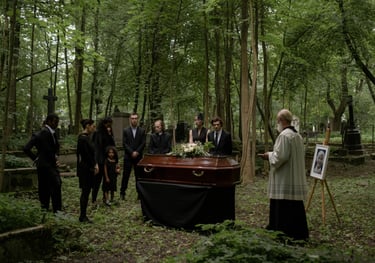
Your story is unique… and like most people, you probably have certain ideas about how you want your life celebrated and remembered. As with all the important milestones accomplished over your lifetime, planning your end-of-life celebration should be done with careful thought.
The death of a loved one is a very difficult time for everyone. Yet, during this period of grief and emotional readjustment, family members and friends are often confronted with dozens of decisions about the memorial services.
What would our loved one have wanted?
What kind of funeral should it be?
What should be included?
Who needs to be notified?
How much will it cost?
By preplanning, these questions and many more will be answered in advance so your family is relieved of that burden.


Preplanning involves making choices about your end-of-life celebration. This is best accomplished by working with a funeral planning advisor who has special training and expertise. They can assist you in creating this personalized celebration of your life.
Let Us Answer Your Funeral Questions
Sometimes it is difficult to know exactly where to start in the funeral planning process. That's exactly why we designed the Funeral Answer Book. It walks you through questions such as: What are my funeral options? How do I select a funeral director or funeral home? What goods and services should I consider? How much is it all going to cost?
The Answer Book also includes a write-in section for you to store your choices all in one place.
Download the Funeral Answer Book.


Not everyone wants the same type of funeral ceremony. The choices people make can be influenced by a variety of religious and cultural traditions, as well as by cost and personal preference.
Traditional Burial
Often considered a traditional funeral, this option refers to a "full-service" funeral involving a funeral director and other funeral service professionals who specialize in this area.
Funeral Service with Cremation
Cremation is a final disposition method in which the body is heated to cremate the remains. The remains can be placed in an urn, scattered, or entombed in a mausoleum or columbarium.
Direct Burial
This means that the burial occurs shortly after death and embalming is not necessary to preserve the body for visitation and viewing.
Direct Cremation
This means that the cremation happens shortly after death and embalming is again not necessary to preserve the body for visitation and viewing.
Veterans Burial
Burial benefits may be available to honorably discharged veterans of the U.S. armed forces.
Benefits vary so the Department of Veterans Affairs (VA) should be contacted for more details.
Green Burial
A green burial is a burial that does not involve embalming with chemicals, metal caskets, or concrete burial vaults.


By preplanning your funeral, you relieve your family of having to make important financial decisions during a period of great stress and grief. Preplanning is easier than you might think. Listed below are the steps involved in the preplanning process.
Gather Your Personal Information
Before you begin to plan, it's important for you to consider how you want your life to be remembered.
To help you with this process, NGL offers a free Answer Book for Funerals. This guide allows you and your family to record how you would like your life to be remembered and celebrated.
Make Arrangements
You can meet with a planning professional who will explain the various options available.
You will decide on what type of funeral you want, what other events (if any) you would like to include and any personal touches you want. Use our Answer Book to help you plan how you want your celebration of life to be remembered.
Prefund Your Funeral
Lastly you will review prefunding payment options. Funeral expenses, like many other valuable services, increase over time.
By prefunding at today's prices, you can be assured that the money will be there to cover future funeral costs. We will ensure that your wishes, and assets, are protected.
With these three easy steps you will be amazed at the peace of mind you will gain by going through this process. Your family will appreciate your thoughtfulness to preplan and prefund for your end-of-life celebration.

Top Ten Reasons to Preplan
Learn about how preplanning can help and protect you and your family.
More and more people are making the decision to prefund their funeral arrangements. Prefunding is setting aside funds today, at today's prices, so you can be certain the money will be there to pay for your services in the future. Funeral costs, like many other valuable services, increase over time and are expected to continue to increase significantly over the next decade.
Benefits
There are a number of benefits to prefunding your funeral:
Funeral services may be carried out at little or no additional cost to your family
Funds are immediately available to pay funeral costs, with no waiting period due to probate or other delays
Flexible payment options are available to meet your needs today
You may be eligible for full benefits even before all your payments are made
The benefit amount grows over time to help offset inflation and that growth is not taxable to you
*Some states may vary on Medicaid rules and eligibility is not guaranteed; please consult an elder law attorney in your state for assistance. Trust limits may vary by state, due to individual state regulations.
**Not available in Indiana. Indiana residents may use the NGL Final Expense Trust, which offers similar benefits using an Indiana-based trust.


Set aside money today
1
2
3
What are the average Funeral Costs?
WHAT exactly is a funeral?
Narrowly defined, a funeral is an organized ceremony where loved ones gather to acknowledge the death of a family member, friend, or associate in order to celebrate the life of the deceased and to honor the role they played in the lives of others. Ceremonies that are religious in nature often affirm the values and beliefs pertinent to that particular faith. Typically, one or more related events are included in the planning of a funeral. These may include a preceremony visitation/wake, a postceremony procession, a formal gathering for disposition of the remains, a gathering of some sort after the ceremony, or even an additional memorial service.
WHAT choices are available?
In recent years, people have learned that there are very few “rules” for planning funerals. Many remain most comfortable with the traditional rituals that have characterized American funerals for generations. But most of these same people today are adding or substituting personal touches. The bottom line is that a funeral can be just about anything you want it to be! The most important thing to keep in mind is that the funeral should offer friends and loved ones the gift of social and spiritual support, as well as emotional release.
WHAT are some of the things I will need to consider?
Like many other major events in your lifetime, there are many details in end-of-life planning. Merchandise Funeral professionals can provide as much as is necessary for the desired services – caskets in many varieties, vaults and/or liners, cremation urns, burial clothes (although most funeral homes prefer to let families provide the clothing). Other items include a nameplate, register book, and prayer cards for visitation and service. All are available in a wide range of prices. In fact, this is an aspect of funerals where personalization can be as important as the actual conduct of services. Should you “pull out all the stops” and request elaborate, top-ofthe-line merchandise? Should austere simplicity be the guide? Most arrangements fall somewhere in between. Your family’s budget and values are your best guide: remember, there are no “wrong” choices, only those that are right for you.
Services
Where?
Possibilities include a house of worship, the funeral home, or a family home (having funerals at home was common a few generations ago, and even now is certainly not unheard of).
When?
Unless a religious doctrine dictates the timing, considerations may include scheduling at the facility you want and travel time for loved ones who live far away – and for a visitation or wake, you may want to establish calling hours.
Who?
Who will be asked to conduct and take part in the funeral (officiant, eulogists, musicians, pallbearers)?
Forms of Services?
People are often surprised to learn that some religions have no prescribed format – and can be extremely flexible in terms of meeting a family’s wishes. For a non-religious funeral, one can truly “write the book.” In virtually all cases, personalized touches will include favorite music and readings.
Disposition of Remains
To many, this is a difficult topic ... one that can be very challenging for surviving family members to address: which is all the more reason for thoughtful preplanning, to make sure your wishes are known. Options include burial, entombment in a mausoleum, cremation (which can be before or after the service), or whole body donation to a scientific institution. Unless the remains are immediately cremated or other factors intervene, the question will also arise as to desires for private or public viewing, and whether the casket will be open or closed during the service.
What about costs?
Some people are comfortable enough with preplanning how a service should be conducted and how remains will be handled but are embarrassed to ask the funeral professional about costs. As we noted earlier, most funeral homes offer services and merchandise in wide price ranges. All try to arrange services that are affordable to the bereaved family. The funeral professional will be happy to provide general price lists, and also costs of professional services, facility and service fees, transportation, merchandise like caskets, urns, outer burial containers, and costs of other services and disbursements. Don’t be afraid to ask about costs. In fact, you may want to take this information home for further detailed study and private discussion before you commit to anything. Over time, every item and service a funeral home offers is subject to inflation- and normally, the cost of a funeral is determined immediately after a death. In other words, the services and goods you priced at $6,000 this year might well exceed $9,000 just five years from now
Traditional Funeral
Service
Funeral Director Services Casket
Use of Funeral Home Embalming
Viewing/Visitation Service Vehicle
Other services
OUR PACKAGES START FROM
$7,900 to $25,000


Cremation
Service Average Cost
Funeral with Cremation $4,500 to $6,500
Direct Cremation $2,500 to $3,500
OUR PACKAGES START FROM
$2,500 - $7,500
Service Average Cost
Ship Out to Mexico $7,600 to $8,500
Ship Out Other Countries $10,900 to $12,000
OUR PACKAGES START FROM
$7,600 - $12,000
International Ship Out




We have payment plans to suit your needs with 3, 5, and 10-year terms.
Remember:
"It's better to have funeral insurance and not need it than to need it and not have it."
WE HAVE AGENTS READY TO ASSIST YOU
Services
Expert solutions for life and health insurance and all your financial needs.
Contact
Support
info@dynamoeagle.com
+1-800-767-4128
© 2024 Dynamo Eagle LLC. All rights reserved.
